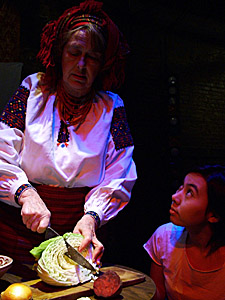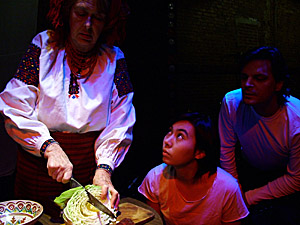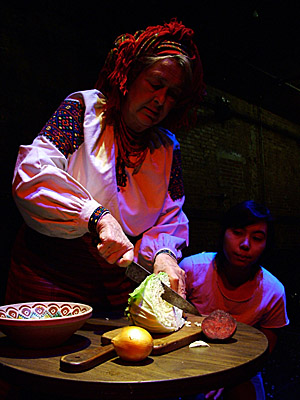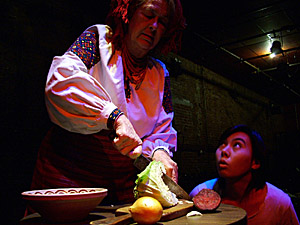
| BRAMA | Theatre | Events | Workshops | Translations | Series | Newsletter | Calendar | Store | Yara Home |

KOLIADA: TWELVE DISHES
World Music-Theater piece is based on an ancient winter rituals from the Carpathians.
Text includes poetry by Serhiy Zhadan, Ukraine's hottest young poet.
Cast includes performers from the Carpathians, and NY members of Yara Arts Group.
NEW YORK -- Yara Arts Group, now celebrating its 15th anniversary, performs Koliada: Twelve Dishes," a new world music-theater work based on ancient winter ritual songs from the Carpathians, from March 4 to 20. Contemporary scenes used in the production have been written by Serhiy Zhadan, Ukraine’s hottest young poet. The multidisciplinary theatrical work was created by director Virlana Tkacz with Yara artists. It centers on a midwinter ritual of the Carpathians in which the forces of nature are invited to dinner. The cast mixes American performers of Yara Arts Group with artists from Carpathians who will perform on traditional instruments, including ten-foot wooden horns.
Work on "Koliada…" started in rehearsals conducted by director Virlana Tkacz with Yara and Ukrainian artists in Kiev in November, 2004. It was presented as a work-in-progress during the Orange Revolution at the Les Kurbas Center, only meters away from the demonstrations in the Square. Yara is currently creating a new version of the piece for American audiences.
Serhiy Zhadan was in New York for the rehearsal period and read his poetry at the Bowery Poetry Club, Wanda Phipps and Virlana Tkacz read their translations of his work. For more on Serhiy Zhadan and his poetry.
For the past two winters Yara’s founding director, Virlana Tkacz, has traveled to a village deep in the mountains and recorded ancient pre-Christian winter solstice rituals and songs. The koliadas, as they are remembered in the Carpathians, are sung incantations that assume the magical powers of voiced words. They are some of the best preserved examples of oral literature, hundreds of years old. Although beautiful Hutsul koliadas had been collected by ethnographers at the end of the 19th and beginning of 20th century in this region, most people assume that these ancient songs were essentially lost. But the tradition has miraculously survived over fifty years of Soviet persecution and has recently experienced a revival. This is the first time these ritual songs have been adapted to the American stage. For more on Yara's reserach trip and Hutsul rituals.
A fox, a thunderstorm and the spirits of the dead are called to the dinner table in the pagan solstice ritual and in the show. The Koliada ritual brings together the present with the past to create a greater community of the living (both human and animal), the dead and nature who must cooperate if the future, the next harvest, is to be bountiful. The production follows the Yara Arts Group style of dramatizing ancient myths with movement, world music, and songs sung in many languages. Songs and incantations of the ritual have been translated for the show into English by Virlana Tkacz and Wanda Phipps.
Each of the play's twelve scenes develops a theme from one of the dishes of the feast, which include Kutia (a porridge of wheat, berries, poppy seeds and honey), Borscht, Dumplings, Stuffed Cabbage, Potatoes, Corn, Stewed Fruits, Beans and Pickled Fish. (The menu is meatless and dairy-less.) The fox, thunderstorm and spirits of the dead reflect, in music and modern poetry, on the fragility of their links to humanity. Kutia donated by Veselka Restaurant is served.
The set, lights and costumes are by Watoku Ueno, Yara’s resident designer and founding member, who is an NEA/TCG award-winning designer. Video is by Andrea Odezysnka. The piece features traditional Hutsul winter songs sung by Ivan Zelenchuk with Dmytro Tafiychuk on folk fiddle and trembita, a mountain horn. The cast includes Yara artists Andrew Colteaux, Olenka Denysenko, Siho Ellsmore, Allison Hiroto, Olga Shuhan, Vira Slywotzky, and Meredith Wright. The piece is multilingual, but is easily accessible to English speaking audiences.
Director Virlana Tkacz heads the Yara Arts Group and has created fifteen original theater pieces with the company, all of which had their American premieres at La MaMa. She is the recipient of this year’s National Endowment for the Arts Poetry Translation Fellowship for her work with Wanda Phipps on Serhiy Zhadan’s newest verse. She is also the author with Sayan Zhambalov and Wanda Phipps of the prize-winning book, "Shanar: Dedication Ritual of a Buryat Shaman in Siberia" (Parabola, 2002).
Last spring at La MaMa, Yara Arts Group created “The Warrior’s Sister.” American Theater Web (Laura Shea) wrote, “the performance reminds us of what theater should be and rarely is—the opportunity to step to a world that is virtually unknown to us.” Yara’s “Circle” at La MaMa in the spring of 2000 was called “a stunningly beautiful work (that) rushes at your senses, makes your heart pound, and shakes your feelings loose.” (Eva Yaa Asantewaa, The Village Voice)
Founded in 1990, Yara Arts Group, a resident company of La MaMa, creates original pieces that explore timely issues rooted in the East through the diverse cultural perspectives of the group's members. Yara artists are of Asian, African, Eastern and Western European ethnic origin. They bring together poetry, song, historical materials and scientific texts, primarily from the East, to form what one critic described as "extended meditation on an idea." The company has created seven pieces based on materials from Eastern Europe including: "A Light from the East," "Blind Sight," "Yara's Forest Song," and "Swan." The New York Times (D.J.R. Bruckner) called “Waterfall/Reflections,” a piece developed with folk singer Nina Matvienko, "a theatrical enchantment given cohesion by choreographed movement and by music on a prodigal scale." Since 1996 Yara has also created seven theater pieces with Buryat artists from Siberia.
Serhiy Zhadan is the most popular poet of the post-independence generation in Ukraine. His work speaks to the disillusionment, difficulties and ironies of life that the collapse of the Soviet Union has brought to the country. Once, the enfant terrible of Ukrainian letters, now approaching 30, he is acknowledged as the most important poet of the current decade, as well as one of the leading voices of the last century. The magisterial anthology, "A Hundred Years of Youth: Bilingual Anthology of 20th Century Ukrainian Poetry" (Litopys: Lviv, 2000), which included the 100 best poets of the twentieth century, concludes with a selection of his work. His most recent published book of poetry, "History of Culture at the Turn of This Century" (Kiev, 2003), has been the talk of literary circles in Ukraine. His visible audience is young and vocal. They fill large auditoriums for his readings and snap up his published books. Mr. Zhadan also has earned deep respect among fellow poets and literary critics. He is undoubtedly the most quoted contemporary writer in Ukraine.
“Koliada” was made possible, in part, by a grant from the Trust for Mutual Understanding, the Self-Reliance (New York) Federal Credit Union, the Alliance for Resident Theatre of New York, Yara's individual contributors and with public funds from the New York State Council on the Arts. 
La MaMa E.T.C. (First Floor Theater)
74A East Fourth Street, between 2nd Ave & the Bowery
New York City
Presented by La MaMa E.T.C.
Th-Sun at 8:00 pm, with matinees on Sun March 13 and 20 at 3:00 pm
$15/tdf Box Office (212) 475- 7710
Online ticketing available at www.lamama.org
Runs 55 minutes.  Olga Shuhan, Siho Ellsmore and Andrew Colteaux in Yara's "Koliada: Twelve Dishes"
Olga Shuhan, Siho Ellsmore and Andrew Colteaux in Yara's "Koliada: Twelve Dishes"
 Olga Shuhan and Siho Ellsmore ain Yara's "Koliada: Twelve Dishes"
Olga Shuhan and Siho Ellsmore ain Yara's "Koliada: Twelve Dishes"
 Olga Shuhan and Siho Ellsmore ain Yara's "Koliada: Twelve Dishes"
Olga Shuhan and Siho Ellsmore ain Yara's "Koliada: Twelve Dishes"
For pictures and reviews see Koliada: Twelve Dishes